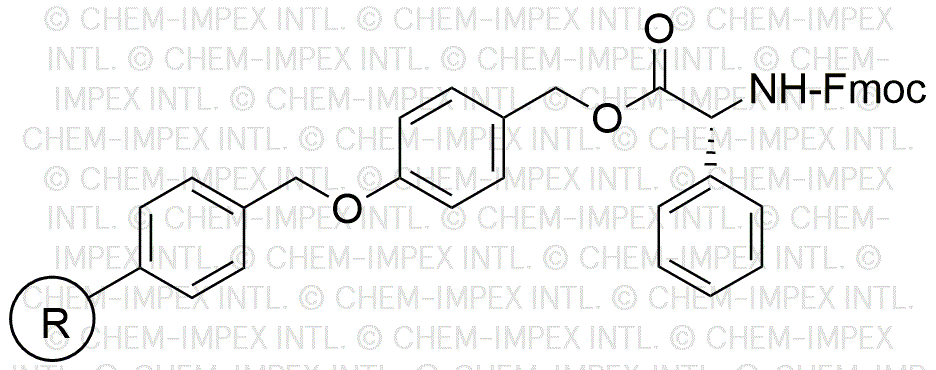Fmoc-D-phenylglycine 4-alkoxybenzyl alcohol resin is widely utilized in research focused on:
- Peptide Synthesis: This resin is crucial in solid-phase peptide synthesis, allowing for the efficient assembly of peptides with high purity and yield.
- Drug Development: It serves as a building block in the development of peptide-based pharmaceuticals, facilitating the creation of targeted therapies.
- Bioconjugation: The resin can be used to attach peptides to various biomolecules, enhancing the specificity and efficacy of drug delivery systems.
- Research in Neuroscience: Its application in synthesizing neuropeptides aids in understanding neurological functions and developing treatments for neurodegenerative diseases.
- Customizable Synthesis: The versatility of the resin allows researchers to modify peptide sequences easily, catering to specific experimental needs and improving research outcomes.
General Information
Properties
Safety and Regulations
Applications
Fmoc-D-phenylglycine 4-alkoxybenzyl alcohol resin is widely utilized in research focused on:
- Peptide Synthesis: This resin is crucial in solid-phase peptide synthesis, allowing for the efficient assembly of peptides with high purity and yield.
- Drug Development: It serves as a building block in the development of peptide-based pharmaceuticals, facilitating the creation of targeted therapies.
- Bioconjugation: The resin can be used to attach peptides to various biomolecules, enhancing the specificity and efficacy of drug delivery systems.
- Research in Neuroscience: Its application in synthesizing neuropeptides aids in understanding neurological functions and developing treatments for neurodegenerative diseases.
- Customizable Synthesis: The versatility of the resin allows researchers to modify peptide sequences easily, catering to specific experimental needs and improving research outcomes.
Documents
Safety Data Sheets (SDS)
The SDS provides comprehensive safety information on handling, storage, and disposal of the product.
Product Specification (PS)
The PS provides a comprehensive breakdown of the product’s properties, including chemical composition, physical state, purity, and storage requirements. It also details acceptable quality ranges and the product's intended applications.
Certificates of Analysis (COA)
Search for Certificates of Analysis (COA) by entering the products Lot Number. Lot and Batch Numbers can be found on a product’s label following the words ‘Lot’ or ‘Batch’.
Numéro de catalogue
Numéro de lot/série
Certificates Of Origin (COO)
This COO confirms the country where the product was manufactured, and also details the materials and components used in it and whether it is derived from natural, synthetic, or other specific sources. This certificate may be required for customs, trade, and regulatory compliance.
Numéro de catalogue
Numéro de lot/série
Safety Data Sheets (SDS)
The SDS provides comprehensive safety information on handling, storage, and disposal of the product.
DownloadProduct Specification (PS)
The PS provides a comprehensive breakdown of the product’s properties, including chemical composition, physical state, purity, and storage requirements. It also details acceptable quality ranges and the product's intended applications.
DownloadCertificates of Analysis (COA)
Search for Certificates of Analysis (COA) by entering the products Lot Number. Lot and Batch Numbers can be found on a product’s label following the words ‘Lot’ or ‘Batch’.
Numéro de catalogue
Numéro de lot/série
Certificates Of Origin (COO)
This COO confirms the country where the product was manufactured, and also details the materials and components used in it and whether it is derived from natural, synthetic, or other specific sources. This certificate may be required for customs, trade, and regulatory compliance.

